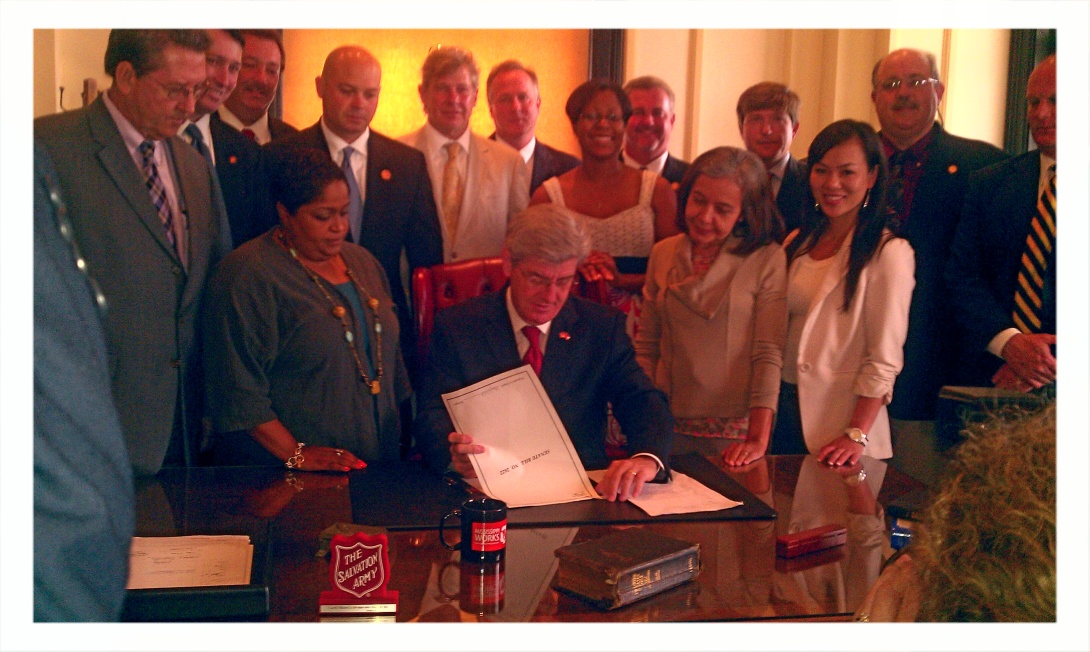New Mississippi law boosts local hiring in disaster's wake

Following Hurricane Katrina and the BP oil spill, Gulf Coast community leaders raised concerns about the failure to prioritize hiring local residents for recovery jobs -- but an innovative new Mississippi law aims to fix that problem.
This week Mississippi Gov. Phil Bryant (R) signed into law the Mississippi Jobs First bill (SB 2622), requiring contractors for public works projects that receive funds related to a federal disaster or major oil spill to first consider potential hires recommended by the Mississippi Department of Employment Security (MDES). It represents one of the first such state hiring policies in the nation.
"I'm proud to be part of this landmark legislation which protects jobs for Mississippi residents," said State Sen. Philip Moran, a Republican representing coastal Hancock and Harrison counties who co-sponsored the bill. "This legislation will strengthen our communities by making sure federal disaster dollars that come to Mississippi are spent here, creating real jobs across the entire state."
Mississippi currently has one of the highest unemployment rates among the states, at 9 percent.
Under the new law, contractors must outline an employment plan when submitting bids for a public works project supported with disaster funds. The plan may include the types of jobs available, skills required and wages paid, and a description of how the contractor will recruit disadvantaged, low-wage and unemployed applicants. MDES can then use the information to line up qualified workers or to start training workers for available jobs.
The Mississippi Jobs First law comes into force as the Gulf anticipates an influx of funds for restoration projects from the BP oil spill fines. The federal RESTORE Act, which would direct 80 percent of Clean Water Act fines against BP to the five Gulf states, passed both the House and Senate as part of a transportation bill and is now in conference committee.
Many Gulf fishermen have been idled by the BP spill, as Facing South/Institute for Southern Studies discussed in "Troubled Waters," a report released last month for the second anniversary of the disaster. Over half of those affected were Vietnamese and Cambodian Americans, but they accounted for less than 10 percent of the fishing vessels hired by BP for the cleanup, according to a racial discrimination lawsuit filed last month in federal court in Louisiana.
The new jobs law presents "an enormous opportunity" for these under-employed workers to find restoration work, said Kaitlin Truong, executive director of the Mississippi-based nonprofit Asian Americans for Change.
"This is a very innovative approach that looks beyond the damaged buildings in a disaster to focus on the heart of the problem," said Minor Sinclair of Oxfam America, among the many Gulf advocacy groups that worked with legislators to pass the law. "We can replace the things that we lose but we need to revitalize a whole economy and the life of a community. This bill puts people back to work, which is vital to putting life back into the area."
(Photo of Mississippi Jobs First bill signing courtesy of Oxfam. Front row, left to right: Rep. Sonya Williams-Barnes; Gov. Phil Bryant; Yumeka Rushing, Oxfam America; Roberta Avila, STEPS Coalition; Kaitlin Truong, Asian Americans for Change. Back row, left to right: Rep. Randall Patterson; Sen. Sean Tindall; Sen Philip Moran; Rep. Casey Eure; Howard Page, STEPS Coalition; Andrew Whitehurst, Gulf Restoration Network; Rep. Charles Busby; Rep. David Baria; Rep. Richard Bennett; Sen. Brice Wiggins.)
Tags
Sue Sturgis
Sue is the former editorial director of Facing South and the Institute for Southern Studies.
